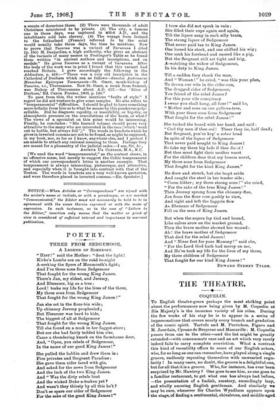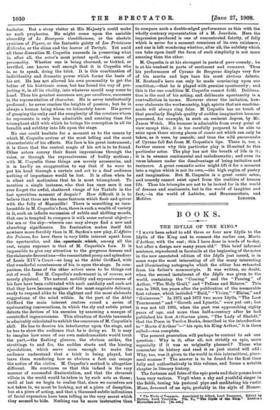THE THEATRE.
COQUELIN.
To English theatre-goers perhaps the most striking point about the performances now being given by M. Coquelin at His Majesty's is the immense variety of his roles. During the few weeks of his stay he is to appear in a series of impersonations that covers nearly every branch and gradation of the comic spirit. Tartufe and M. Perrichon, Figaro and M. Jourdain, Cyrano de Bergerac and Mascarille : M. Coquelin passes from one to the other—and the list might be greatly extended—with consummate ease and an art which very rarely indeed fails to carry complete conviction. What a contrast this kind of versatility offers to some of our English actors, who, for so long as one can remember, have played along a single groove, endlessly repeating themselves with unwearied regu- larity I In many eases, no doubt, the groove is a delightful one, but for all that it is a groove. Who, for instance, has ever been surprised by Mr. Hawtrey P One goes to see him, as one goes to a familiar restaurant, to get what one has always had before, —the presentation of a foolish, amatory, exceedingly lazy, and wholly amusing English gentleman. And similarly we may be sure, whenever Sir Charles Wyndham appears upon the stage, of finding a sentimental, chivalrous, and middle-aged
bachelor. But a stray visitor at His Majesty's could make no such prophecies. He might come upon the amiable absurdity of Le Bourgeois Gentilhomme, or the electric cynicism of Figaro, or the fantastic gaiety of Les Prgcieuses Bidicules, or the slime and the horror of Tartufe. Yet amid all these diversities M. Coquelin succeeds in preserving what is, after all, the actor's most potent spell,—the sense of personality. Whether one is being charmed, or tickled, or terrified, one knows well enough that it is Coquelin who is, so to speak, doing the trick. It is this combination of individuality and dramatic power which forms the basis of his art. He has not allowed his own personality to get. the better of his histrionic sense, but has found the way of pro- jecting it, in all its vitality, into whatever mould may come to hand. Thus his greatest successes are, par excellence, successes in the representation of character. He is never intellectually profound ; he never reaches the heights of passion; but he is always a human being whom we intimately know. His power of grasping the unity and the complexity of the creature whom. be represents is only less admirable and amazing than the triumphant skill with which he brings his conception in all its breadth and subtlety into life upon the stage.
No one could hesitate for a moment as to the means by which M. Coquelin arrives at the most telling and the most characteristic of his effects. His face is his great instrument ; it is there that the central magic of his art is to be found. Other actors convey their finest impressions through the voice, or through the expressiveness of bodily motions ; with M. Coquelin these things are merely accessories, and it is hardly an exaggeration to say that if he were to put his head through a curtain and act to a deaf audience nothing of importance would be lost. It is often when he is silent and motionless that he is most triumphant. To mention a single instance, who that has once seen it can ever forget the awful, shattered visage of his Tartufe in the last speechless moment of despair ? How difficult it is to believe that these are the same features which flash and quiver with the folly of Mascarille! There is something so inex- haustible in M. Coquelin's face, there is such a wealth of variety in it, such an infinite succession of subtle and shifting moods, that one is tempted to compare it with some natural object— the sea or the sky—wherein one may always find a new and absorbing significance. Its fascination makes itself felt nowhere more forcibly than in M. Sardou's new play, L'Afaire des Poisons, for here there is very little interest apart from the spectacular, and the .spectaele -winch, among all the rest, reigns supreme is that of M. Coquelin's face. It is impossible to give any attention to the gorgeous dresses and the elaborate decorations—the resuscitated pomp and splendour of Louis XIV.'s Court—so long as the Abbe Griffard, with that wonderful countenance of his, is upon the stage. In com- parison, the faces of the other actors seem to be things cut out of wood. But M. Coquelin's endowment is, of course, not merely physical. The natural mobility and expressiveness of his face have been cultivated with such assiduity and such art that they have become engines of the most exquisite delicacy, ready to respond alike to the slightest and the most elaborate suggestions of the mind within. In the part of the Abbe Griffard the main interest centres round a series of equivocating conversations, in which the sly and subtle priest detects the devices of his enemies by assuming a masque of countrified ingenuousness. This situation of double innuendo is admirably calculated to exhibit the resources of M. Coquelin's skill. He has to deceive his interlocutor upon the stage, and be has to show the audience that be is doing so. It is easy to imagine how some of our own melodramatists would treat the part,—the flashing glances, the obvious asides, the struttings to and fro, the sudden starts and the hissing ejaculations, which serve soon enough to make the audience understand that a trick is being played, but leave them wondering how so obvious a fact can escape the notice of the victim. M. Coquelin's method is altogether different. He convinces us that this indeed is the very manner of successful dissimulation, and that the cleverest villain in the world would be taken in by such arts as those ; until at last we begin to realise that, since we ourselves are not taken in, we must be looking, not at a piece of deception, but at a piece of acting, and that a thousand subtle indications of facial expression have been telling us the very secret which they seemed to hide. Nothing can be more instructive than to compare such a double-edged performance as this with the wholly contrary representation of a M. Jourdain. Here the impression produced is one of concentrated fatuity, of folly which is never for a moment conscious of its own existence ; and one is left wondering whether, after all, the subtlety which can take upon itself the form of such simplicity is not more amazing than the other.
M. Coquelin is at his strongest in parts of pure comedy; he is at his weakest in parts of sentiment and romance. Thus his performance of Cyrano de Bergerac displays very few of his merits and lays bare his most obvious defects. M. Rostand's hero can only be made convincing upon one condition,—that he is played with genuine spontaneity ; and this is the one condition M. Coquelin cannot fulfil. Delibera- tion is the soul of his acting, and deliberate spontaneity is a contradiction in terms. However clever the imitation, how- ever elaborate the workmanship, high spirits that are machine- made will always ring false. M. Coquelin has no touch of that peculiarly English quality of sudden imaginative humour possessed, for example, in such an eminent degree, by Mr. James Welch. His humour is admirable from every point of view except this ; it is too carefully prepared to be able to seize upon those strong places of comic art which can only be taken, as it were, by assault; and thus the wild gasconnades of Cyrano fall flat from M. Coquelin's lips. There is, too, a further reason why this particular play is ill-suited to this particular actor. The play has not the breath of life in it; it is in essence sentimental and melodramatic ; and even its verse labours under the disadvantage of being imitative and insincere. A great romantic actor might lift it for a moment into a region which is not its own,—the high region of poetry and imagination. But M. Coquelin is a great comic actor, and comedy cannot exist apart from the realities of human life. Thus his triumphs are not to be looked for in the world of dreams and sentiments, but in the world of laughter and fact,—in the world of Labiche, and Beaumarchais, and Moliere. IGNOTUS.























































 Previous page
Previous page